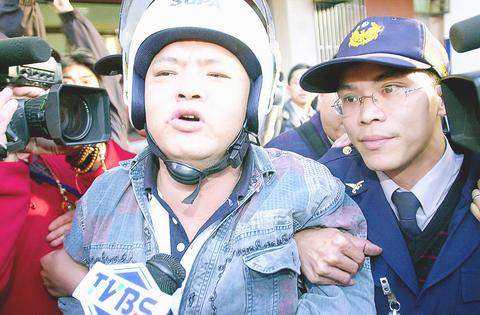A man suspected of being mentally disturbed set fire to the first floor of the DPP's headquarters yesterday while President Chen Shui-bian (
The fire caused minor damage and no one was injured.
Witnesses said the man -- later identified as 39-year-old Lin Wen-chuang (

PHOTO: SEAN CHAO, TAIPEI TIMES
Julia Chen (
She said the man then swore, poured gasoline on the store's counter and set fire to it. Flames from the fire, which witnesses said reached around 2m in height, burned a model airplane on the counter before staff put it out.
Witnesses said the man went outside the shop, saying he would wait for the media to arrive.
As the police took him away, he told reporters that the president owed him money.
Lin later told the police that he came from Taitung yesterday morning to appeal to Chen for NT$2 million that he said the DPP's Taitung office owed him.
Lin's family said he suffered from a mental disorder, but police said they had not confirmed this.
Police said they would detain Lin for endangering public safety.
The DPP was quick to condemn the attack.
DPP Deputy Secretary-General Lee Chin-yung (
It was the first time the DPP's headquarters have been attacked in such a way, although on Jan. 6, party staff caught a burglar there.
The DPP tightened security at its headquarters after the president assumed the party's chairmanship last July because Chen has to attend Central Standing Committee meetings there every Tuesday.

WAITING GAME: The US has so far only offered a ‘best rate tariff,’ which officials assume is about 15 percent, the same as Japan, a person familiar with the matter said Taiwan and the US have completed “technical consultations” regarding tariffs and a finalized rate is expected to be released soon, Executive Yuan spokeswoman Michelle Lee (李慧芝) told a news conference yesterday, as a 90-day pause on US President Donald Trump’s “reciprocal” tariffs is set to expire today. The two countries have reached a “certain degree of consensus” on issues such as tariffs, nontariff trade barriers, trade facilitation, supply chain resilience and economic security, Lee said. They also discussed opportunities for cooperation, investment and procurement, she said. A joint statement is still being negotiated and would be released once the US government has made

Authorities have detained three former Taiwan Semiconductor Manufacturing Co (TMSC, 台積電) employees on suspicion of compromising classified technology used in making 2-nanometer chips, the Taiwan High Prosecutors’ Office said yesterday. Prosecutors are holding a former TSMC engineer surnamed Chen (陳) and two recently sacked TSMC engineers, including one person surnamed Wu (吳) in detention with restricted communication, following an investigation launched on July 25, a statement said. The announcement came a day after Nikkei Asia reported on the technology theft in an exclusive story, saying TSMC had fired two workers for contravening data rules on advanced chipmaking technology. Two-nanometer wafers are the most

NEW GEAR: On top of the new Tien Kung IV air defense missiles, the military is expected to place orders for a new combat vehicle next year for delivery in 2028 Mass production of Tien Kung IV (Sky Bow IV) missiles is expected to start next year, with plans to order 122 pods, the Ministry of National Defense’s (MND) latest list of regulated military material showed. The document said that the armed forces would obtain 46 pods of the air defense missiles next year and 76 pods the year after that. The Tien Kung IV is designed to intercept cruise missiles and ballistic missiles to an altitude of 70km, compared with the 60km maximum altitude achieved by the Missile Segment Enhancement variant of PAC-3 systems. A defense source said yesterday that the number of

Taiwanese exports to the US are to be subject to a 20 percent tariff starting on Thursday next week, according to an executive order signed by US President Donald Trump yesterday. The 20 percent levy was the same as the tariffs imposed on Vietnam, Sri Lanka and Bangladesh by Trump. It was higher than the tariffs imposed on Japan, South Korea and the EU (15 percent), as well as those on the Philippines (19 percent). A Taiwan official with knowledge of the matter said it is a "phased" tariff rate, and negotiations would continue. "Once negotiations conclude, Taiwan will obtain a better